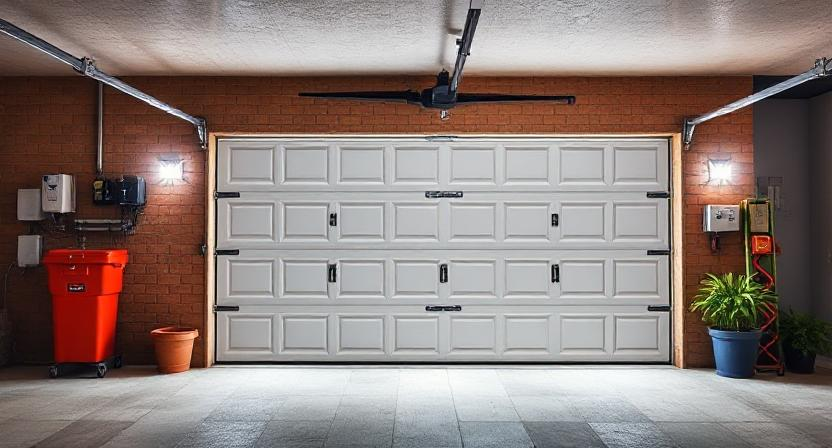That garage door opener is a workhorse. It’s one of the most used appliances in your home, faithfully opening and closing multiple times a day, year after year. But like any mechanical device, it doesn’t last forever. If you’re asking yourself, “How long do garage door openers last?” you’re not alone. It’s a common question for homeowners noticing a slowdown, new noises, or intermittent failures.
How Long Do Garage Door Openers Last?
The short answer is that the average garage door opener has a lifespan of 10 to 15 years. However, that number isn’t set in stone. Its actual longevity depends on a cocktail of factors including quality, usage, maintenance, and environment.
This ultimate guide will dive deep into what determines an opener’s lifespan, the tell-tale signs that yours is on its last legs, and crucial maintenance tips to squeeze every possible year out of your unit.
The 10-15 Year Rule: Why This Is the Average Lifespan
Think of the 10-15 year range as a benchmark for a reasonably well-maintained, mid-grade opener from a reputable brand. The internal components, such as the motor, gears, and circuit board, are designed to endure a certain number of cycles (one cycle = opening + closing). Based on average family use (3-4 cycles per day), this translates to roughly 10-15 years of reliable service.
After this point, wear and tear simply become too significant. Metal gears grind down, plastic parts become brittle, and electronic components can fail. It’s often more cost-effective to replace an opener nearing the end of this lifespan than to repeatedly repair it.
Key Factors That Determine How Long Your Garage Door Opener Will Last
The 10-15 year average is just a starting point. Your specific opener could conk out in 8 years or keep humming for 20. Here’s what makes the difference:
1. Quality and Type of Opener
Not all openers are created equal. They generally come in three types, each with a different life expectancy:
-
Chain-Drive: The most common and affordable type. They use a metal chain to move the trolley that opens the door. They are durable and powerful but tend to be the noisiest. Lifespan: 10-15 years.
-
Belt-Drive: These use a reinforced rubber belt instead of a chain. They are significantly quieter and smoother than chain-drives, reducing vibration and wear on the entire system. This often leads to a longer functional life. Lifespan: 12-15+ years.
-
Screw-Drive: These use a threaded steel rod to move the trolley. They have fewer moving parts than chain-drives, which can mean less maintenance. However, they can be sensitive to temperature extremes. Lifespan: 10-13 years.
2. Frequency of Use (Cycles)
This is the most obvious factor. A single-person household that uses the opener once a day will get far more years out of it than a busy family of five that uses it ten times a day. More cycles mean more wear on the motor, gears, and drive system.
3. Weight and Balance of the Garage Door
Your opener is designed to lift a specific weight. If your garage door is heavy, unbalanced, or has broken springs, the opener must strain immensely to do its job. This extra load drastically shortens the motor’s and gearbox’s life. A properly balanced door should be easy to lift manually; if it’s not, your opener is working overtime.
4. Environmental Conditions
Where your garage is located matters. Garages that are not insulated and are subject to:
-
Extreme Heat: Can cause the motor to overheat and warp plastic components.
-
High Humidity and Cold: Promotes rust and corrosion on metal parts and can affect electronic connections.
-
Dust and Debris: Can clog moving parts and cause premature wear.
5. Maintenance and Care
This is the most important variable within your control. An opener that is never lubricated, never inspected, and has its safety features ignored will fail long before a well-maintained one. Simple actions can add years to its l
7 Clear Signs It’s Time to Replace Your Garage Door Opener
Knowing how long garage door openers last is helpful, but watching for symptoms is more important. If your opener exhibits any of these signs, its time is likely up.
1. It’s Making Strange Noises
Grinding, screeching, or chattering noises from a chain or belt-drive model often indicate worn-out gears or a straining motor. Loud grinding is frequently the death rattle of the main gear and sprocket assembly.
2. It’s Slowing Down or Struggling
The door should open and close at a consistent speed. If it’s moving slower than usual, pausing, or jerking, the motor is likely losing its power and efficiency.
3. It Doesn’t Respond to Commands (Sometimes)
If you press the button and nothing happens—but it works on the second or third try—it’s a sign of failing electronics or a dying circuit board. This intermittent operation is a classic symptom of age.
4. The Motor Runs, But the Door Doesn’t Move
This is a sure sign of a stripped main gear. The motor hums because it’s getting power, but the plastic gear that transfers that power to the chain or belt is so worn down that it can’t engage.
5. It Reverses for No Reason
If your door hits the floor and immediately reverses, or reverses mid-travel without touching anything, it could be misaligned safety sensors. However, if the sensors are clean and aligned, the problem is likely a failing logic board that can’t properly process the safety signals.
6. It’s Excessively Noisy
While chain-drives are naturally louder, a sudden increase in racket—banging, shaking, vibrating—suggests internal components are failing and causing strain on the entire system.
7. It’s a Very Old Model (15+ Years)
Even if it “still works,” an opener this old lacks modern safety features. New models are required to have non-contact reversing technology (using an infrared beam) instead of the old pressure-sensitive systems. Upgrading is a critical safety improvement for your family.
How to Extend the Life of Your Garage Door Opener
You can directly influence the answer to “how long do garage door openers last?” by following these maintenance tips:
1. Lubricate Regularly: Every six months, lubricate the chain or screw drive with a dedicated garage door lubricant. Also, keep the door’s springs, rollers, and hinges lubricated to reduce the overall load on the opener.
2. Maintain a Balanced Door: Test the balance of your door annually. Disconnect the opener (using the manual release cord) and lift the door manually. It should open smoothly and stay in place about halfway up. If it doesn’t, your springs need adjustment by a professional.
3. Keep it Clean: Dust and debris can get into the opener’s housing. Gently vacuum around and inside the unit (after disconnecting power) to keep it clean.
4. Tighten Hardware: The vibrations of operation can loosen bolts and brackets on the opener, the rail, and the door itself. Go around with a socket wrench every year and tighten everything up.
5. Test the Safety Features Monthly: Place a small object (like a roll of paper towels) in the door’s path and try to close it. The door should reverse immediately upon contact. This ensures the safety sensors are working, preventing strain and accidents.
Repair vs. Replace: Making the Right Choice
When your opener acts up, should you fix it or replace it?
-
Consider Repair If: The opener is less than 7 years old, the repair is simple (like a sensor realignment), or the cost is less than half the price of a new unit.
- Consider Replacement If: The opener is over 10 years old, the main motor or gearbox is failing, or the repair cost is high. Investing in a new, efficient, and safer model is wiser than pouring money into an old unit that will likely develop another problem soon.
The Benefits of Upgrading to a New Garage Door Opener
Replacing an old opener isn’t just about fixing a problem—it’s an upgrade.
-
Quieter Operation: New belt-drive and direct-drive models are incredibly quiet.
-
Enhanced Safety: Modern photo-eye sensors and automatic reverse are far more reliable.
-
Smart Technology: Control and monitor your door from anywhere in the world with your smartphone, receive alerts, and integrate with home assistants like Alexa.
-
Improved Security: Rolling code technology changes the access code every time you use the remote, preventing code theft.
-
Better Warranty: New units come with long warranties, giving you peace of mind.
Conclusion: Maximizing Your Opener’s Years of Service
So, how long do garage door openers last? While 10-15 years is a reliable estimate, the true answer is: it depends on you. Through proactive maintenance, ensuring your door is balanced, and addressing problems early, you can ensure your garage door opener serves you reliably for its maximum possible lifespan.
When the signs of failure become clear, don’t hesitate to invest in a replacement. A new opener is an investment in your home’s convenience, security, and safety.

hello friends
my name is Sumit kumar. I am the owner of this website and I share only garage door and lift master information and only informational posts on my website. And I have written this post myself and have given you only a good guide and information.


